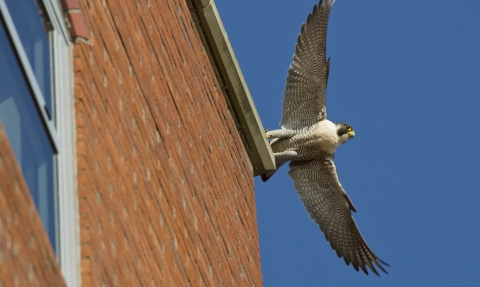
Peregrine falcon by Bertie Gregory/2020VISION
The peregrine project
For the last five years a pair of peregrine falcons has nested on Buckinghamshire County Council's County Hall in Aylesbury. Live cameras watching the nest followed them as they raised their chicks.
In March 2017 the peregrines returned to breed again. Video footage of the nest and chick was streamed live from Aylesbury Peregrine Project in association with Bucks Bird Club.
In 2018, there was sadly a technical problem with the cameras. However, the nesting peregrine falcons did successfully raise a chick.
Check back in spring next year, when the cameras should be working again.
Why are they nesting here?
Peregrine falcons usually nest on cliff faces but are becoming more common in towns where they use tall buildings instead.
These are the first pair known to be nesting in Buckinghamshire. As County Hall lacks ledges, a nesting platform was built and installed along with the live nest cameras, hosted by Aylesbury Vale District Council, to follow this wildlife spectacle.
Where can I watch this?
You can see the platform, which is on the 12th floor of County Hall, from street level but the webcams let us see what is happening in the nest live and allowing us to follow the birds' story from laying their eggs to the chicks fledging. Look out for the adult birds hunting around County Hall as it gets dark.
What will I see?
- 3-4 eggs are usually laid between late March and April at 2-3 day intervals.
- They are incubated by both parents for 29-32 days before hatching in early May.
- Once the eggs hatch the female will brood the young chicks for 2-3 weeks while the male brings in food.
- After that both parents will provide food until the chicks fledge at 35-42 days old.
- Their parents then teach them to hunt and handle prey in flight.
Did you know?
- Peregrine falcons are the fastest animal on earth, reaching speeds of up to 200mph when hunting
- There are about 1,500 breeding pairs of peregrine falcons in the UK
- These make up around 20% of the European population
- Historically, peregrine falcons suffered from persecution and pesticide-use which indirectly poisoned them
- Peregrine falcons are now protected by law. Special licences were obtained from Natural England before installing the nest platform.
You can browse video clips from previous years below.
The most exciting animal on the planet
